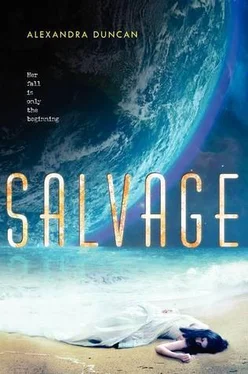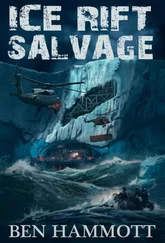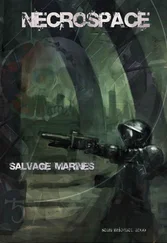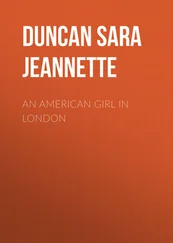I lower the book, my grandfather’s words ringing behind my ears. Objects of my study? Seamlessly . . . with the pursuit of knowledge foremost in my mind. Seamlessly? What about my mother? What about me? And Soraya, all alone in this house until we came? His choices are still echoing through us, even so many generations later. Shouldn’t we have mattered more than knowlege? Everything I knew of my grandfather—the gifts for my mother and how good and kind he was to my grandmother, how he supported our crewe from afar, how he wasn’t a meddler—shatters. I pick up the book again, heat flooding my cheeks. I flip through and stop on a random page.
. . . found gender roles to be strictly divided aboard crewe ships. The Parastrata is typical in this regard. Women shoulder the brunt of the most basic functional work, putting in long hours dyeing cloth, cooking, cleaning, washing clothes, and caring for animals and children. Their hands are never idle. Even in their spare moments, they are always weaving cloth or mending ripped seams. Virginity is highly prized, and thus, girls are married off as early as thirteen to ensure paternity and maximize each woman’s effective childbearing years.
I should stop reading, but I can’t. I slip my hand inside my pocket and grip my data pendant without looking away from the page.
Meanwhile, the work of navigation and repairing the electronic and mechanical components of the ship is reserved for men, as are trade negotiations. These often must be conducted planetside. As a result, it is necessary for men to maintain the physical capability to withstand the increased gravitational pull exerted by large planetary bodies. To counteract the painful and potentially damaging effects of transferring from the crewe ship’s relatively low gravity field to a high-gravity environment, the men and boys engage in daily strength training and periodically spend time in compression chambers that simulate the effects of one full G of force, equal to the gravitational pull of Earth.
From examination of early crewe records reviewed in preparation for my field research, it became apparent that, early in their history, crewes required gravitational acclimation training (GAT) for both male and female members. Captain Harrah and the other senior men aboard the Parastrata insist this is not so, and that part of the reason the crewes originally left Earth was to spare their women contact with “the impure world.” One must presume the practice of allowing women to participate in GAT changed gradually over time and became incorporated into the crewes’ shared origin mythology. The long-term effects on crewewomen’s health are unclear, but warrant further research.
I draw in a sharp breath. He knew. I lower the book and blink into the yellow light. He knew what staying on the creweship would do to my mother and to me. He knew we would spend our days weaving and baking and cleaning until our fingers blistered, that we would be married off to produce baby after baby. He knew what would happen to our bodies if we ever tried to leave. And he left us there.
“I thought you’d come here sooner or later.”
I jump and reach for my knife.
Soraya stands in the door. She lowers herself into the chair across the desk and holds out her hand for the book.
I let go of the knife and push the book across to her. A red crescent moon marks my palm where my data pendant dug into my skin.
“Where did you find it?”
“Khajjiar,” I say.
She sighs, a heavy sound. “To be honest, I’m surprised you haven’t run across this before now.”
“Is it . . .” I’m not sure how to say what I mean. “Have a lot of people read it?”
Soraya nods. “My father, your grandfather, built his reputation on this book, this research.” She rests it carefully on the edge of the desk. “He was a controversial man. What he did, that’s not how research is done. There was the scandal over his marriage to Maram—my mother left him over it—and so of course everyone wanted to read it.”
“Is that what I am?” I look down at the book. “Is that all we were to him—my mother and grandmother and me? Research?”
I think on Modrie Reller talking up how the so doctor once sent us a pair of cats, a queen and a tom, so we could breed them and sell their offspring to other ships or outposts overrun by rats. So generous, all the oldgirls agreed. We could make good money that way. Now I look around at the wealth of this place—water so plentiful we can use it to bathe, and machines to do the cooking and washing—and it’s clear that was nothing to him. Those cats were likely strays plucked off the street or bought for the cost of a cup of tea, an afterthought.
You should be grateful he thought of you at all, Modrie Reller’s voice scolds at the back of my head. But he didn’t. He didn’t care to think on what would become of my mother and me. I always believed he did, that he cherished us from afar. But we were worth no more to him than those cats. He wasn’t alive when my mother died, still so young, or when my father tried to trade me off to ther Fortune, but he knew what our lives would be when he left us behind, and he didn’t lift a finger to stop it. It’s all there in black and white.
I push the chair back and turn to the window. I didn’t understand before how mere marks on a screen could cut and ricochet. I didn’t understand the power they could have. Suddenly it seems too dangerous to be cooped up here, neatly folded inside when I could burst into flames any minute and bring this whole house, this whole world, down around me.
“I need to go,” I choke out.
“Ava.” Soraya stands, steps between me and the door.
“Please. I can’t be in here right now.”
“But it’s late.” Soraya wavers. “It’s dangerous, a girl out alone at night.”
“Soraya, please.” I hear the desperate, wavering whine in my voice, but there’s nothing I can do to stop it. No one has ever cared what happened to me, and right now, I don’t either. I only know I need to be away, out of this house, alone. I bolt for the door. Soraya steps aside at the last slip, before I knock into her. I grab my crow from the kitchen charger and stuff it in the pocket of Perpétue’s jacket, wrap the leather tight around me, and throw open the front door.
“Ava, wait!” Soraya calls as I duck past the rosewood trees.
But I ignore her. I shut myself down, double my steps, and barrel forward into the humid Mumbai night.
I tramp down from the quiet residential paths, house lights winking behind thick shrubbery, to the lev train stop. I ride until I reach the edge of the city and hop off at a random station. The streets teem with people and a whirl of neon and colored signs—JUICY pow! GET SOME NOW!—RAM’S DREAM—HOT, HOT HOT! I thread through narrow streets, dodging a pack of kids staging a water-gun battle and a group of women parading one of their number, a twenty-something girl with hennaed hands and a T-shirt reading KISS THE BRIDE, ahead of them. They sing at the top of their lungs. The close buildings and the haze of streetlamps muzzle up the sky and cast everything in a perpetual half day.
Then the buildings part on a footbridge and it rises into view, the Salt, with its water pipes and its light-studded hill looming above me like a great circled hive of lamps and people and buildings. I didn’t know where I was going until I was here.
I step quick, half to keep away from the men smoking in alleys and drunks stumbling down the side ways, and half because I can’t bear to stand still. All that anger and fear and hate packed tight in me radiates as it burns. The drunks step out of my path and the smokers slip their eyes past me, looking for other girls giving off less heat.
Читать дальше












